Essay on Management Ethics: Roles and Responsibilities
VerifiedAdded on 2022/12/15
|8
|2234
|384
Essay
AI Summary
This essay delves into the crucial role of management ethics in shaping organizational behavior and success. It emphasizes the importance of ethical decision-making processes, highlighting how managers must establish clear ethical guidelines and expectations for employees. The essay underscores the impact of leadership in fostering a culture of ethical conduct, which includes setting examples, providing communication channels for reporting unethical behavior, and empowering employees to make ethical choices. Furthermore, it explores how ethical leadership can lead to increased employee motivation, improved customer relations, and overall business sustainability. The essay concludes by reiterating the managers' responsibility in promoting and encouraging ethical behavior within their organizations, stressing that the future of the business hinges on their commitment to these principles.
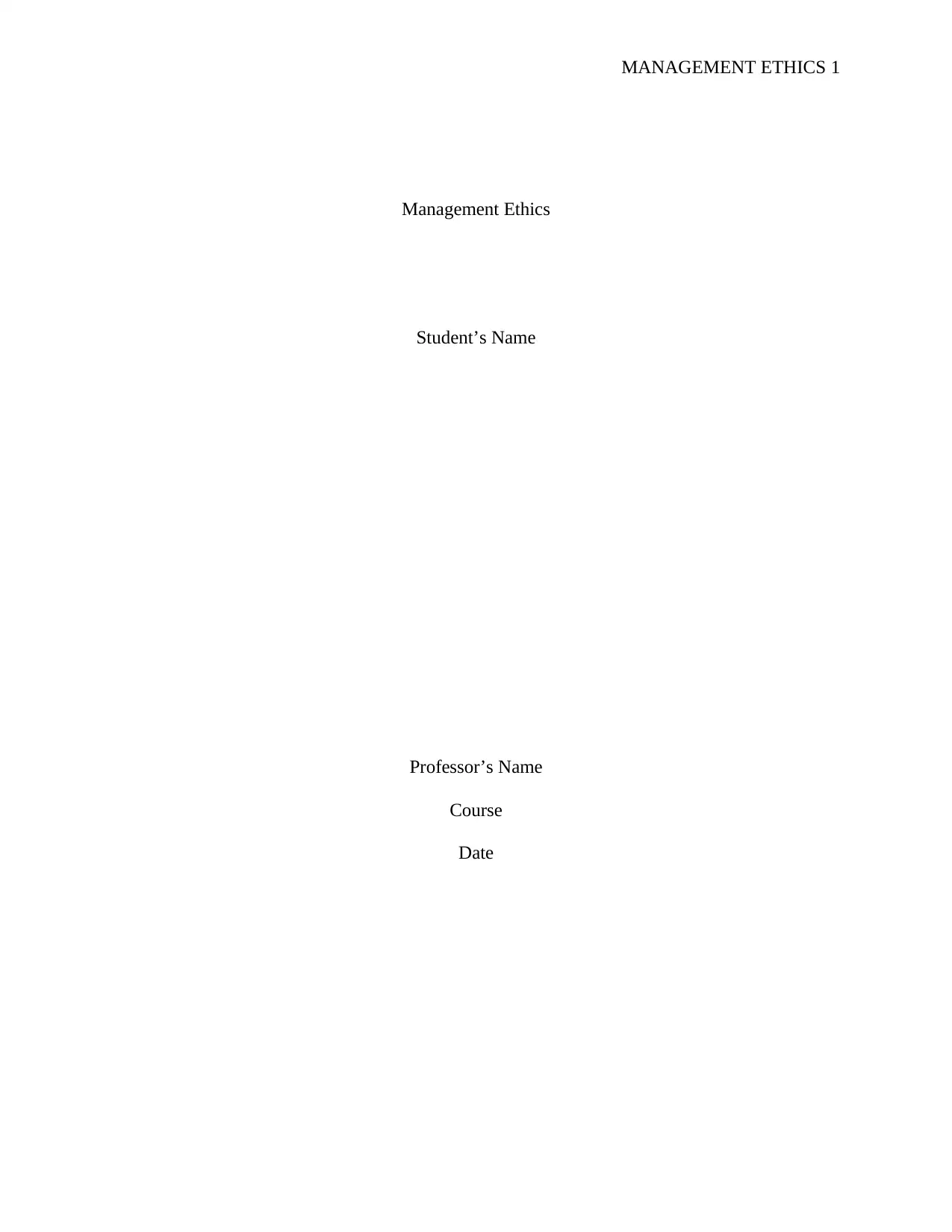
MANAGEMENT ETHICS 1
Management Ethics
Student’s Name
Professor’s Name
Course
Date
Management Ethics
Student’s Name
Professor’s Name
Course
Date
Paraphrase This Document
Need a fresh take? Get an instant paraphrase of this document with our AI Paraphraser
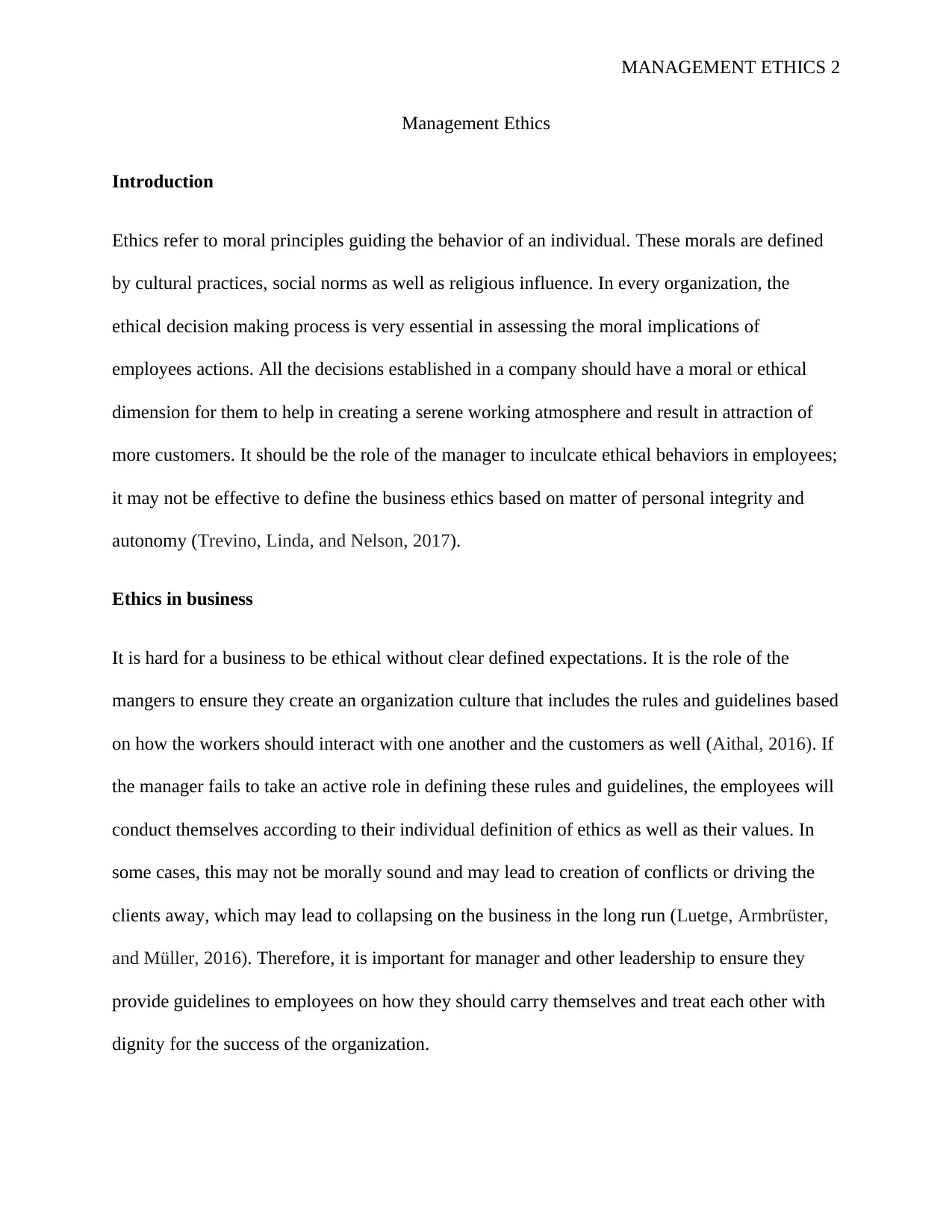
MANAGEMENT ETHICS 2
Management Ethics
Introduction
Ethics refer to moral principles guiding the behavior of an individual. These morals are defined
by cultural practices, social norms as well as religious influence. In every organization, the
ethical decision making process is very essential in assessing the moral implications of
employees actions. All the decisions established in a company should have a moral or ethical
dimension for them to help in creating a serene working atmosphere and result in attraction of
more customers. It should be the role of the manager to inculcate ethical behaviors in employees;
it may not be effective to define the business ethics based on matter of personal integrity and
autonomy (Trevino, Linda, and Nelson, 2017).
Ethics in business
It is hard for a business to be ethical without clear defined expectations. It is the role of the
mangers to ensure they create an organization culture that includes the rules and guidelines based
on how the workers should interact with one another and the customers as well (Aithal, 2016). If
the manager fails to take an active role in defining these rules and guidelines, the employees will
conduct themselves according to their individual definition of ethics as well as their values. In
some cases, this may not be morally sound and may lead to creation of conflicts or driving the
clients away, which may lead to collapsing on the business in the long run (Luetge, Armbrüster,
and Müller, 2016). Therefore, it is important for manager and other leadership to ensure they
provide guidelines to employees on how they should carry themselves and treat each other with
dignity for the success of the organization.
Management Ethics
Introduction
Ethics refer to moral principles guiding the behavior of an individual. These morals are defined
by cultural practices, social norms as well as religious influence. In every organization, the
ethical decision making process is very essential in assessing the moral implications of
employees actions. All the decisions established in a company should have a moral or ethical
dimension for them to help in creating a serene working atmosphere and result in attraction of
more customers. It should be the role of the manager to inculcate ethical behaviors in employees;
it may not be effective to define the business ethics based on matter of personal integrity and
autonomy (Trevino, Linda, and Nelson, 2017).
Ethics in business
It is hard for a business to be ethical without clear defined expectations. It is the role of the
mangers to ensure they create an organization culture that includes the rules and guidelines based
on how the workers should interact with one another and the customers as well (Aithal, 2016). If
the manager fails to take an active role in defining these rules and guidelines, the employees will
conduct themselves according to their individual definition of ethics as well as their values. In
some cases, this may not be morally sound and may lead to creation of conflicts or driving the
clients away, which may lead to collapsing on the business in the long run (Luetge, Armbrüster,
and Müller, 2016). Therefore, it is important for manager and other leadership to ensure they
provide guidelines to employees on how they should carry themselves and treat each other with
dignity for the success of the organization.
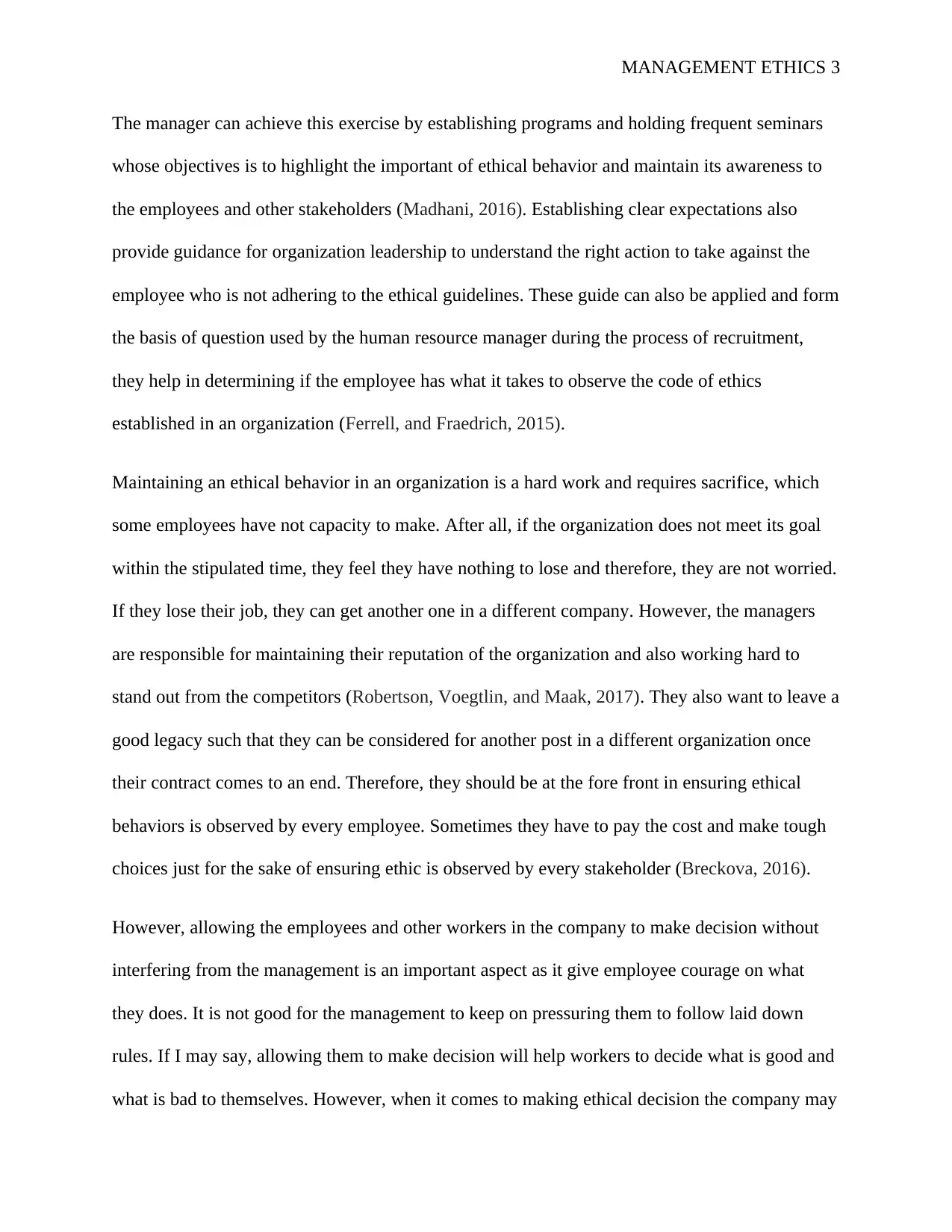
MANAGEMENT ETHICS 3
The manager can achieve this exercise by establishing programs and holding frequent seminars
whose objectives is to highlight the important of ethical behavior and maintain its awareness to
the employees and other stakeholders (Madhani, 2016). Establishing clear expectations also
provide guidance for organization leadership to understand the right action to take against the
employee who is not adhering to the ethical guidelines. These guide can also be applied and form
the basis of question used by the human resource manager during the process of recruitment,
they help in determining if the employee has what it takes to observe the code of ethics
established in an organization (Ferrell, and Fraedrich, 2015).
Maintaining an ethical behavior in an organization is a hard work and requires sacrifice, which
some employees have not capacity to make. After all, if the organization does not meet its goal
within the stipulated time, they feel they have nothing to lose and therefore, they are not worried.
If they lose their job, they can get another one in a different company. However, the managers
are responsible for maintaining their reputation of the organization and also working hard to
stand out from the competitors (Robertson, Voegtlin, and Maak, 2017). They also want to leave a
good legacy such that they can be considered for another post in a different organization once
their contract comes to an end. Therefore, they should be at the fore front in ensuring ethical
behaviors is observed by every employee. Sometimes they have to pay the cost and make tough
choices just for the sake of ensuring ethic is observed by every stakeholder (Breckova, 2016).
However, allowing the employees and other workers in the company to make decision without
interfering from the management is an important aspect as it give employee courage on what
they does. It is not good for the management to keep on pressuring them to follow laid down
rules. If I may say, allowing them to make decision will help workers to decide what is good and
what is bad to themselves. However, when it comes to making ethical decision the company may
The manager can achieve this exercise by establishing programs and holding frequent seminars
whose objectives is to highlight the important of ethical behavior and maintain its awareness to
the employees and other stakeholders (Madhani, 2016). Establishing clear expectations also
provide guidance for organization leadership to understand the right action to take against the
employee who is not adhering to the ethical guidelines. These guide can also be applied and form
the basis of question used by the human resource manager during the process of recruitment,
they help in determining if the employee has what it takes to observe the code of ethics
established in an organization (Ferrell, and Fraedrich, 2015).
Maintaining an ethical behavior in an organization is a hard work and requires sacrifice, which
some employees have not capacity to make. After all, if the organization does not meet its goal
within the stipulated time, they feel they have nothing to lose and therefore, they are not worried.
If they lose their job, they can get another one in a different company. However, the managers
are responsible for maintaining their reputation of the organization and also working hard to
stand out from the competitors (Robertson, Voegtlin, and Maak, 2017). They also want to leave a
good legacy such that they can be considered for another post in a different organization once
their contract comes to an end. Therefore, they should be at the fore front in ensuring ethical
behaviors is observed by every employee. Sometimes they have to pay the cost and make tough
choices just for the sake of ensuring ethic is observed by every stakeholder (Breckova, 2016).
However, allowing the employees and other workers in the company to make decision without
interfering from the management is an important aspect as it give employee courage on what
they does. It is not good for the management to keep on pressuring them to follow laid down
rules. If I may say, allowing them to make decision will help workers to decide what is good and
what is bad to themselves. However, when it comes to making ethical decision the company may
⊘ This is a preview!⊘
Do you want full access?
Subscribe today to unlock all pages.

Trusted by 1+ million students worldwide
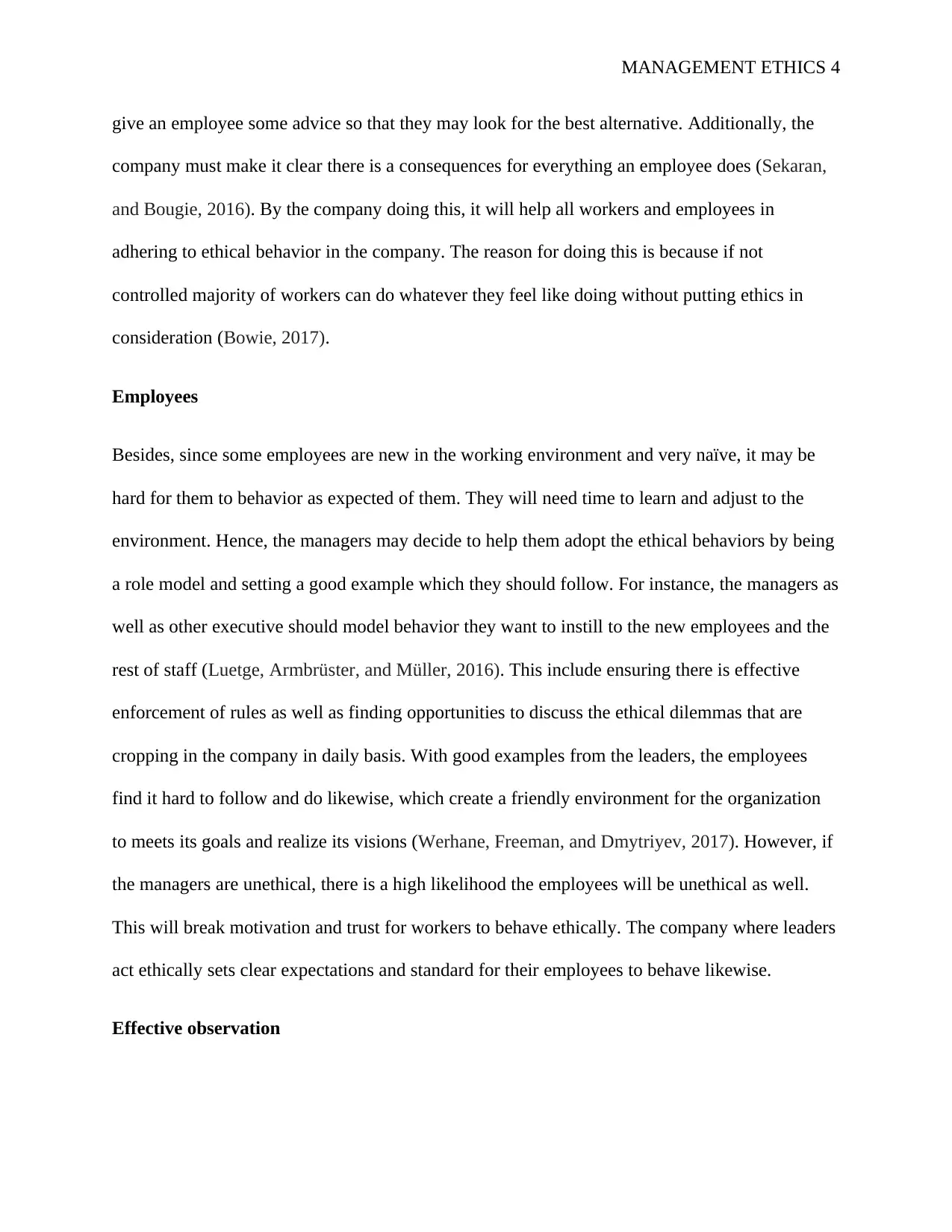
MANAGEMENT ETHICS 4
give an employee some advice so that they may look for the best alternative. Additionally, the
company must make it clear there is a consequences for everything an employee does (Sekaran,
and Bougie, 2016). By the company doing this, it will help all workers and employees in
adhering to ethical behavior in the company. The reason for doing this is because if not
controlled majority of workers can do whatever they feel like doing without putting ethics in
consideration (Bowie, 2017).
Employees
Besides, since some employees are new in the working environment and very naïve, it may be
hard for them to behavior as expected of them. They will need time to learn and adjust to the
environment. Hence, the managers may decide to help them adopt the ethical behaviors by being
a role model and setting a good example which they should follow. For instance, the managers as
well as other executive should model behavior they want to instill to the new employees and the
rest of staff (Luetge, Armbrüster, and Müller, 2016). This include ensuring there is effective
enforcement of rules as well as finding opportunities to discuss the ethical dilemmas that are
cropping in the company in daily basis. With good examples from the leaders, the employees
find it hard to follow and do likewise, which create a friendly environment for the organization
to meets its goals and realize its visions (Werhane, Freeman, and Dmytriyev, 2017). However, if
the managers are unethical, there is a high likelihood the employees will be unethical as well.
This will break motivation and trust for workers to behave ethically. The company where leaders
act ethically sets clear expectations and standard for their employees to behave likewise.
Effective observation
give an employee some advice so that they may look for the best alternative. Additionally, the
company must make it clear there is a consequences for everything an employee does (Sekaran,
and Bougie, 2016). By the company doing this, it will help all workers and employees in
adhering to ethical behavior in the company. The reason for doing this is because if not
controlled majority of workers can do whatever they feel like doing without putting ethics in
consideration (Bowie, 2017).
Employees
Besides, since some employees are new in the working environment and very naïve, it may be
hard for them to behavior as expected of them. They will need time to learn and adjust to the
environment. Hence, the managers may decide to help them adopt the ethical behaviors by being
a role model and setting a good example which they should follow. For instance, the managers as
well as other executive should model behavior they want to instill to the new employees and the
rest of staff (Luetge, Armbrüster, and Müller, 2016). This include ensuring there is effective
enforcement of rules as well as finding opportunities to discuss the ethical dilemmas that are
cropping in the company in daily basis. With good examples from the leaders, the employees
find it hard to follow and do likewise, which create a friendly environment for the organization
to meets its goals and realize its visions (Werhane, Freeman, and Dmytriyev, 2017). However, if
the managers are unethical, there is a high likelihood the employees will be unethical as well.
This will break motivation and trust for workers to behave ethically. The company where leaders
act ethically sets clear expectations and standard for their employees to behave likewise.
Effective observation
Paraphrase This Document
Need a fresh take? Get an instant paraphrase of this document with our AI Paraphraser
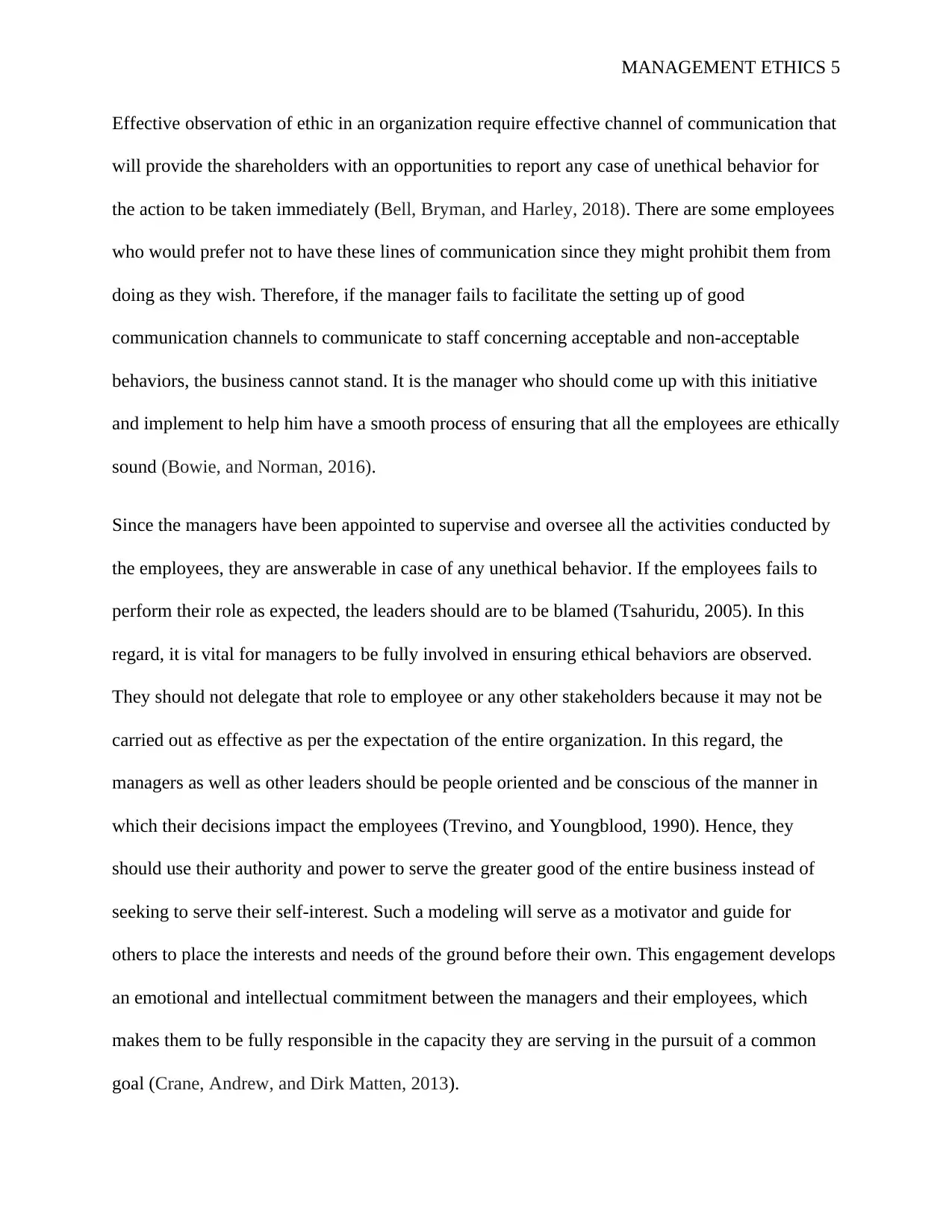
MANAGEMENT ETHICS 5
Effective observation of ethic in an organization require effective channel of communication that
will provide the shareholders with an opportunities to report any case of unethical behavior for
the action to be taken immediately (Bell, Bryman, and Harley, 2018). There are some employees
who would prefer not to have these lines of communication since they might prohibit them from
doing as they wish. Therefore, if the manager fails to facilitate the setting up of good
communication channels to communicate to staff concerning acceptable and non-acceptable
behaviors, the business cannot stand. It is the manager who should come up with this initiative
and implement to help him have a smooth process of ensuring that all the employees are ethically
sound (Bowie, and Norman, 2016).
Since the managers have been appointed to supervise and oversee all the activities conducted by
the employees, they are answerable in case of any unethical behavior. If the employees fails to
perform their role as expected, the leaders should are to be blamed (Tsahuridu, 2005). In this
regard, it is vital for managers to be fully involved in ensuring ethical behaviors are observed.
They should not delegate that role to employee or any other stakeholders because it may not be
carried out as effective as per the expectation of the entire organization. In this regard, the
managers as well as other leaders should be people oriented and be conscious of the manner in
which their decisions impact the employees (Trevino, and Youngblood, 1990). Hence, they
should use their authority and power to serve the greater good of the entire business instead of
seeking to serve their self-interest. Such a modeling will serve as a motivator and guide for
others to place the interests and needs of the ground before their own. This engagement develops
an emotional and intellectual commitment between the managers and their employees, which
makes them to be fully responsible in the capacity they are serving in the pursuit of a common
goal (Crane, Andrew, and Dirk Matten, 2013).
Effective observation of ethic in an organization require effective channel of communication that
will provide the shareholders with an opportunities to report any case of unethical behavior for
the action to be taken immediately (Bell, Bryman, and Harley, 2018). There are some employees
who would prefer not to have these lines of communication since they might prohibit them from
doing as they wish. Therefore, if the manager fails to facilitate the setting up of good
communication channels to communicate to staff concerning acceptable and non-acceptable
behaviors, the business cannot stand. It is the manager who should come up with this initiative
and implement to help him have a smooth process of ensuring that all the employees are ethically
sound (Bowie, and Norman, 2016).
Since the managers have been appointed to supervise and oversee all the activities conducted by
the employees, they are answerable in case of any unethical behavior. If the employees fails to
perform their role as expected, the leaders should are to be blamed (Tsahuridu, 2005). In this
regard, it is vital for managers to be fully involved in ensuring ethical behaviors are observed.
They should not delegate that role to employee or any other stakeholders because it may not be
carried out as effective as per the expectation of the entire organization. In this regard, the
managers as well as other leaders should be people oriented and be conscious of the manner in
which their decisions impact the employees (Trevino, and Youngblood, 1990). Hence, they
should use their authority and power to serve the greater good of the entire business instead of
seeking to serve their self-interest. Such a modeling will serve as a motivator and guide for
others to place the interests and needs of the ground before their own. This engagement develops
an emotional and intellectual commitment between the managers and their employees, which
makes them to be fully responsible in the capacity they are serving in the pursuit of a common
goal (Crane, Andrew, and Dirk Matten, 2013).
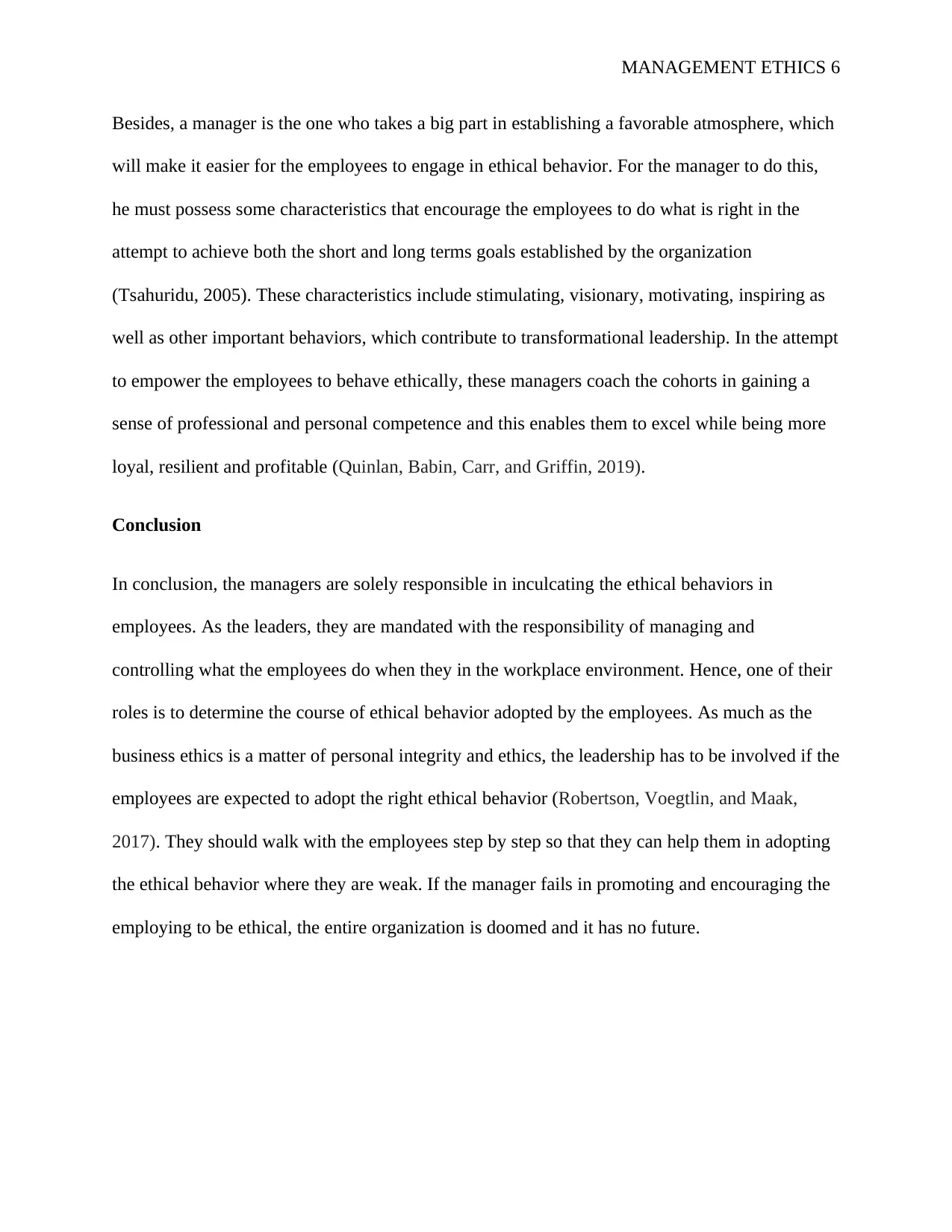
MANAGEMENT ETHICS 6
Besides, a manager is the one who takes a big part in establishing a favorable atmosphere, which
will make it easier for the employees to engage in ethical behavior. For the manager to do this,
he must possess some characteristics that encourage the employees to do what is right in the
attempt to achieve both the short and long terms goals established by the organization
(Tsahuridu, 2005). These characteristics include stimulating, visionary, motivating, inspiring as
well as other important behaviors, which contribute to transformational leadership. In the attempt
to empower the employees to behave ethically, these managers coach the cohorts in gaining a
sense of professional and personal competence and this enables them to excel while being more
loyal, resilient and profitable (Quinlan, Babin, Carr, and Griffin, 2019).
Conclusion
In conclusion, the managers are solely responsible in inculcating the ethical behaviors in
employees. As the leaders, they are mandated with the responsibility of managing and
controlling what the employees do when they in the workplace environment. Hence, one of their
roles is to determine the course of ethical behavior adopted by the employees. As much as the
business ethics is a matter of personal integrity and ethics, the leadership has to be involved if the
employees are expected to adopt the right ethical behavior (Robertson, Voegtlin, and Maak,
2017). They should walk with the employees step by step so that they can help them in adopting
the ethical behavior where they are weak. If the manager fails in promoting and encouraging the
employing to be ethical, the entire organization is doomed and it has no future.
Besides, a manager is the one who takes a big part in establishing a favorable atmosphere, which
will make it easier for the employees to engage in ethical behavior. For the manager to do this,
he must possess some characteristics that encourage the employees to do what is right in the
attempt to achieve both the short and long terms goals established by the organization
(Tsahuridu, 2005). These characteristics include stimulating, visionary, motivating, inspiring as
well as other important behaviors, which contribute to transformational leadership. In the attempt
to empower the employees to behave ethically, these managers coach the cohorts in gaining a
sense of professional and personal competence and this enables them to excel while being more
loyal, resilient and profitable (Quinlan, Babin, Carr, and Griffin, 2019).
Conclusion
In conclusion, the managers are solely responsible in inculcating the ethical behaviors in
employees. As the leaders, they are mandated with the responsibility of managing and
controlling what the employees do when they in the workplace environment. Hence, one of their
roles is to determine the course of ethical behavior adopted by the employees. As much as the
business ethics is a matter of personal integrity and ethics, the leadership has to be involved if the
employees are expected to adopt the right ethical behavior (Robertson, Voegtlin, and Maak,
2017). They should walk with the employees step by step so that they can help them in adopting
the ethical behavior where they are weak. If the manager fails in promoting and encouraging the
employing to be ethical, the entire organization is doomed and it has no future.
⊘ This is a preview!⊘
Do you want full access?
Subscribe today to unlock all pages.

Trusted by 1+ million students worldwide
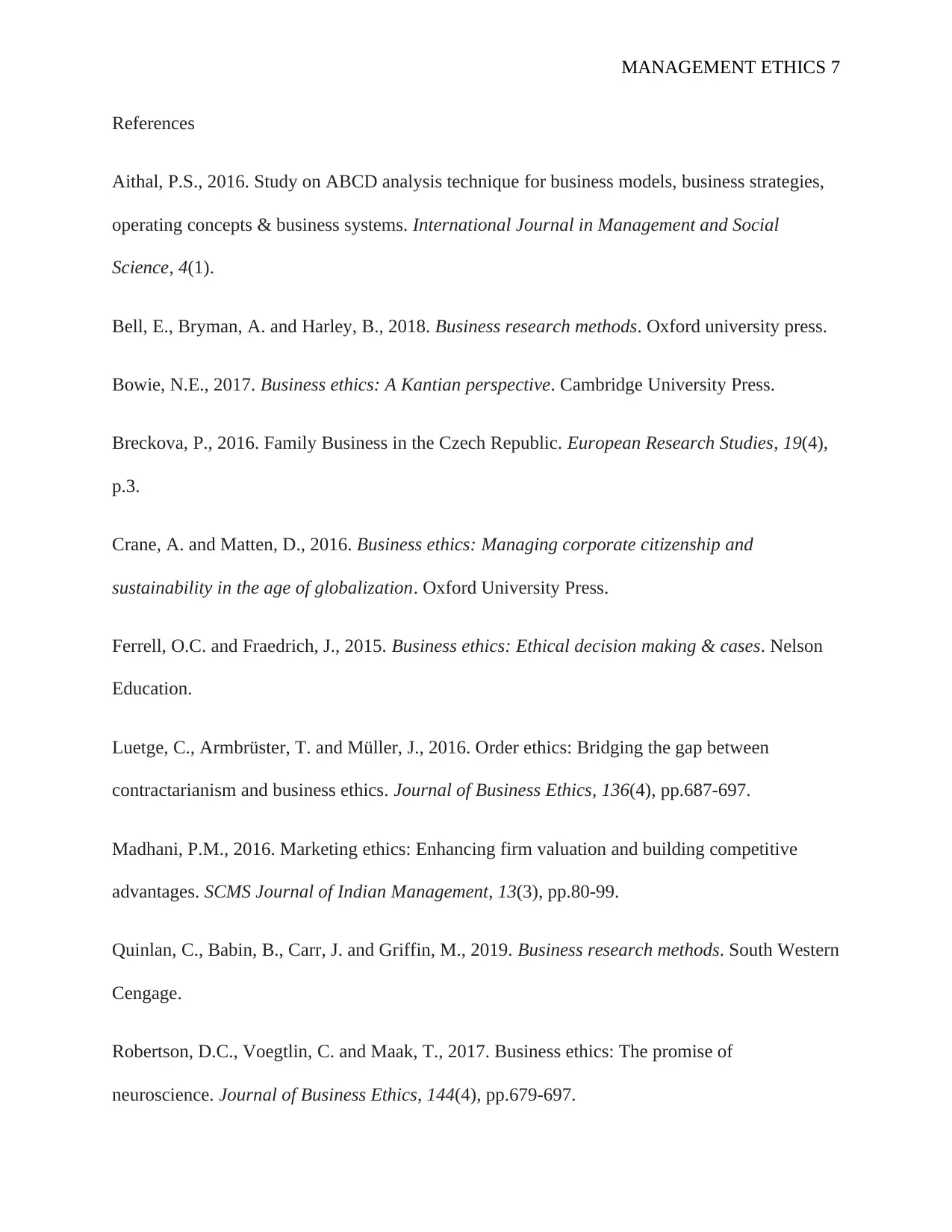
MANAGEMENT ETHICS 7
References
Aithal, P.S., 2016. Study on ABCD analysis technique for business models, business strategies,
operating concepts & business systems. International Journal in Management and Social
Science, 4(1).
Bell, E., Bryman, A. and Harley, B., 2018. Business research methods. Oxford university press.
Bowie, N.E., 2017. Business ethics: A Kantian perspective. Cambridge University Press.
Breckova, P., 2016. Family Business in the Czech Republic. European Research Studies, 19(4),
p.3.
Crane, A. and Matten, D., 2016. Business ethics: Managing corporate citizenship and
sustainability in the age of globalization. Oxford University Press.
Ferrell, O.C. and Fraedrich, J., 2015. Business ethics: Ethical decision making & cases. Nelson
Education.
Luetge, C., Armbrüster, T. and Müller, J., 2016. Order ethics: Bridging the gap between
contractarianism and business ethics. Journal of Business Ethics, 136(4), pp.687-697.
Madhani, P.M., 2016. Marketing ethics: Enhancing firm valuation and building competitive
advantages. SCMS Journal of Indian Management, 13(3), pp.80-99.
Quinlan, C., Babin, B., Carr, J. and Griffin, M., 2019. Business research methods. South Western
Cengage.
Robertson, D.C., Voegtlin, C. and Maak, T., 2017. Business ethics: The promise of
neuroscience. Journal of Business Ethics, 144(4), pp.679-697.
References
Aithal, P.S., 2016. Study on ABCD analysis technique for business models, business strategies,
operating concepts & business systems. International Journal in Management and Social
Science, 4(1).
Bell, E., Bryman, A. and Harley, B., 2018. Business research methods. Oxford university press.
Bowie, N.E., 2017. Business ethics: A Kantian perspective. Cambridge University Press.
Breckova, P., 2016. Family Business in the Czech Republic. European Research Studies, 19(4),
p.3.
Crane, A. and Matten, D., 2016. Business ethics: Managing corporate citizenship and
sustainability in the age of globalization. Oxford University Press.
Ferrell, O.C. and Fraedrich, J., 2015. Business ethics: Ethical decision making & cases. Nelson
Education.
Luetge, C., Armbrüster, T. and Müller, J., 2016. Order ethics: Bridging the gap between
contractarianism and business ethics. Journal of Business Ethics, 136(4), pp.687-697.
Madhani, P.M., 2016. Marketing ethics: Enhancing firm valuation and building competitive
advantages. SCMS Journal of Indian Management, 13(3), pp.80-99.
Quinlan, C., Babin, B., Carr, J. and Griffin, M., 2019. Business research methods. South Western
Cengage.
Robertson, D.C., Voegtlin, C. and Maak, T., 2017. Business ethics: The promise of
neuroscience. Journal of Business Ethics, 144(4), pp.679-697.
Paraphrase This Document
Need a fresh take? Get an instant paraphrase of this document with our AI Paraphraser
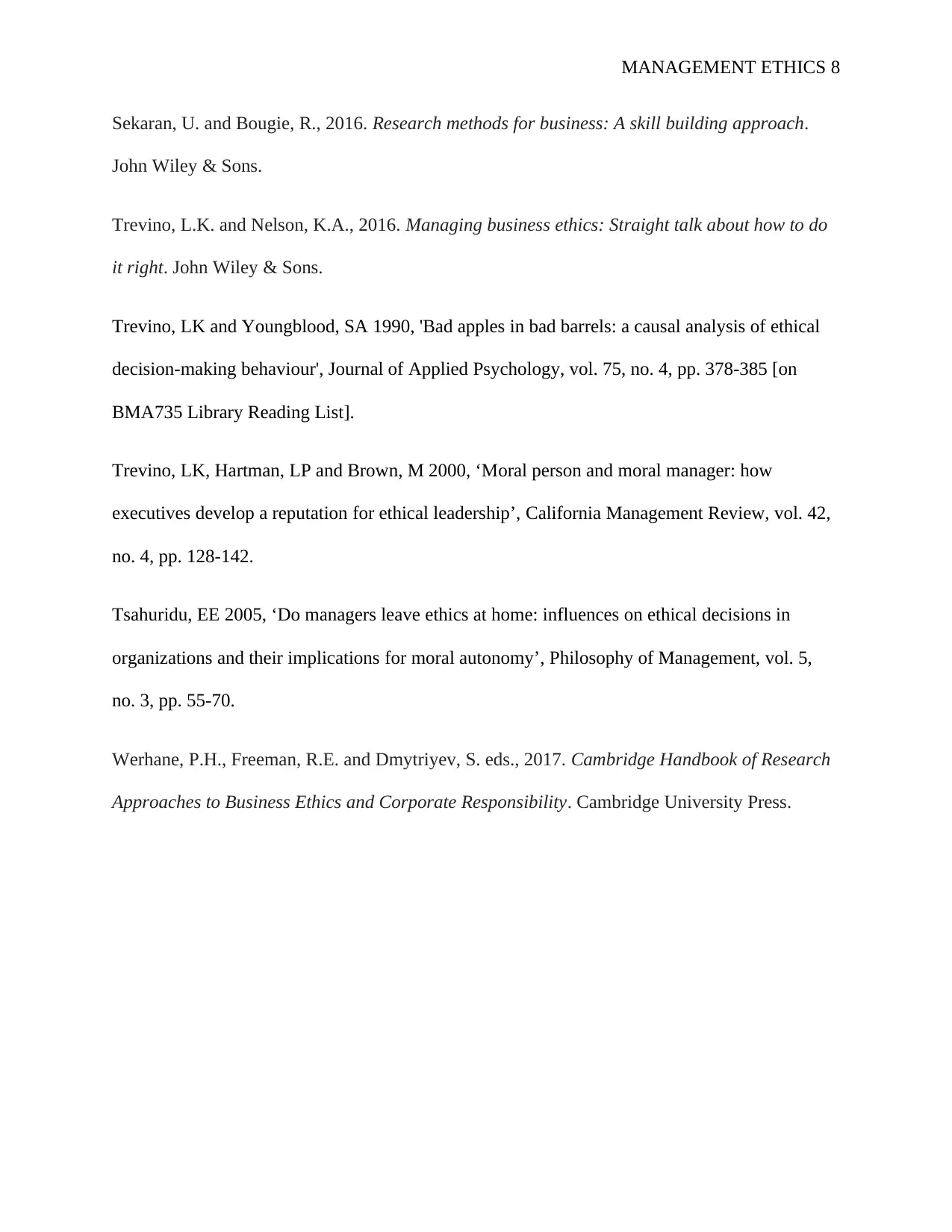
MANAGEMENT ETHICS 8
Sekaran, U. and Bougie, R., 2016. Research methods for business: A skill building approach.
John Wiley & Sons.
Trevino, L.K. and Nelson, K.A., 2016. Managing business ethics: Straight talk about how to do
it right. John Wiley & Sons.
Trevino, LK and Youngblood, SA 1990, 'Bad apples in bad barrels: a causal analysis of ethical
decision-making behaviour', Journal of Applied Psychology, vol. 75, no. 4, pp. 378-385 [on
BMA735 Library Reading List].
Trevino, LK, Hartman, LP and Brown, M 2000, ‘Moral person and moral manager: how
executives develop a reputation for ethical leadership’, California Management Review, vol. 42,
no. 4, pp. 128-142.
Tsahuridu, EE 2005, ‘Do managers leave ethics at home: influences on ethical decisions in
organizations and their implications for moral autonomy’, Philosophy of Management, vol. 5,
no. 3, pp. 55-70.
Werhane, P.H., Freeman, R.E. and Dmytriyev, S. eds., 2017. Cambridge Handbook of Research
Approaches to Business Ethics and Corporate Responsibility. Cambridge University Press.
Sekaran, U. and Bougie, R., 2016. Research methods for business: A skill building approach.
John Wiley & Sons.
Trevino, L.K. and Nelson, K.A., 2016. Managing business ethics: Straight talk about how to do
it right. John Wiley & Sons.
Trevino, LK and Youngblood, SA 1990, 'Bad apples in bad barrels: a causal analysis of ethical
decision-making behaviour', Journal of Applied Psychology, vol. 75, no. 4, pp. 378-385 [on
BMA735 Library Reading List].
Trevino, LK, Hartman, LP and Brown, M 2000, ‘Moral person and moral manager: how
executives develop a reputation for ethical leadership’, California Management Review, vol. 42,
no. 4, pp. 128-142.
Tsahuridu, EE 2005, ‘Do managers leave ethics at home: influences on ethical decisions in
organizations and their implications for moral autonomy’, Philosophy of Management, vol. 5,
no. 3, pp. 55-70.
Werhane, P.H., Freeman, R.E. and Dmytriyev, S. eds., 2017. Cambridge Handbook of Research
Approaches to Business Ethics and Corporate Responsibility. Cambridge University Press.
1 out of 8
Related Documents
Your All-in-One AI-Powered Toolkit for Academic Success.
+13062052269
info@desklib.com
Available 24*7 on WhatsApp / Email
![[object Object]](/_next/static/media/star-bottom.7253800d.svg)
Unlock your academic potential
Copyright © 2020–2026 A2Z Services. All Rights Reserved. Developed and managed by ZUCOL.





